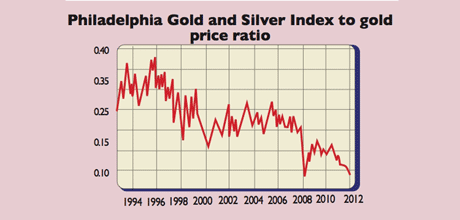Get exposure to gold miners
Gold mining shares are trading at record lows. But picking winners is hard. So, you're best bet is to buy an exchange-traded fund, says Paul Amery. Here, he looks at three.

Get the latest financial news, insights and expert analysis from our award-winning MoneyWeek team, to help you understand what really matters when it comes to your finances.
You are now subscribed
Your newsletter sign-up was successful
Want to add more newsletters?

Twice daily
MoneyWeek
Get the latest financial news, insights and expert analysis from our award-winning MoneyWeek team, to help you understand what really matters when it comes to your finances.

Four times a week
Look After My Bills
Sign up to our free money-saving newsletter, filled with the latest news and expert advice to help you find the best tips and deals for managing your bills. Start saving today!
According to at least one key measure, gold mining shares are as cheap as at any time in the last 30 years. The ratio between the Philadelphia Gold and Silver Index (XAU) and the gold price recently dipped below 0.1, a level it's seen only once before, during the depths of the late-2008 crisis. Sounds good. But picking gold mining winners is notoriously hard. So to gain simple, diversified exposure to the sector as a whole, it's worth considering an exchange-traded fund (ETF).
For UK-based investors, three ETFs fit the bill: iShares' S&P Commodity Producers Gold ETF (LSE: SPGP), ETF Exchange's DaxGlobal Gold Mining Fund (LSE: AUCO, AUCP for listings in dollars and sterling, respectively) and the RBS Market Access NYSE Arca Gold Bugs Index ETF (LSE: GOLB). But which should you buy?
The first thing to check with ETFs is the underlying index. The Gold Bugs index tracked by the RBS ETF includes only stocks that don't hedge (sell forward) their output. Ten years ago, most miners did hedge, and many lost out on huge gold price gains. Unsurprisingly, hedging isn't now widely undertaken and, as a result, the indices tracked by the three ETFs resemble each other, at least when it comes to the top holdings. SPGP and AUCO have longer "tails" of smaller stocks than GOLB, however.
MoneyWeek
Subscribe to MoneyWeek today and get your first six magazine issues absolutely FREE

Sign up to Money Morning
Don't miss the latest investment and personal finances news, market analysis, plus money-saving tips with our free twice-daily newsletter
Don't miss the latest investment and personal finances news, market analysis, plus money-saving tips with our free twice-daily newsletter

SPGP charges less in annual expenses (0.55%) than AUCO (0.65%) and GOLB (0.7%). AUCO and GOLB also charge swap spreads of around 30 and ten basis points a year, respectively. Swap spreads are a variable payment to the counterparty providing the index return to the fund and will be reflected in the fund's tracking difference against the index.
Of the three funds, GOLB is the largest, with $200m under management, compared with AUCO's $78m and SPGB's $45m. According to the London Stock Exchange, GOLB also tends to trade with tighter bid-offer spreads than the other two, at around 0.8% on average for a round-trip trade, against 1%-2% for AUCO and SPGB.
As most of the indices' underlying stocks are traded in America, make sure you buy and sell after 2.30pm London time, when spreads will be tighter, and consider using a limit order to control trading costs. If you're looking to hold longer-term, SPGP's lower costs argue for buying the iShares fund. If you're a more regular trader, we'd recommend you go with RBS Market Access's GOLB.
Paul Amery edits www.indexuniverse.eu , the top source of news and analyses on Europe's ETF and index-fund market.
Get the latest financial news, insights and expert analysis from our award-winning MoneyWeek team, to help you understand what really matters when it comes to your finances.
Paul is a multi-award-winning journalist, currently an editor at New Money Review. He has contributed an array of money titles such as MoneyWeek, Financial Times, Financial News, The Times, Investment and Thomson Reuters. Paul is certified in investment management by CFA UK and he can speak more than five languages including English, French, Russian and Ukrainian. On MoneyWeek, Paul writes about funds such as ETFs and the stock market.
-
 Should you buy an active ETF?
Should you buy an active ETF?ETFs are often mischaracterised as passive products, but they can be a convenient way to add active management to your portfolio
-
 Power up your pension before 5 April – easy ways to save before the tax year end
Power up your pension before 5 April – easy ways to save before the tax year endWith the end of the tax year looming, pension savers currently have a window to review and maximise what’s going into their retirement funds – we look at how
